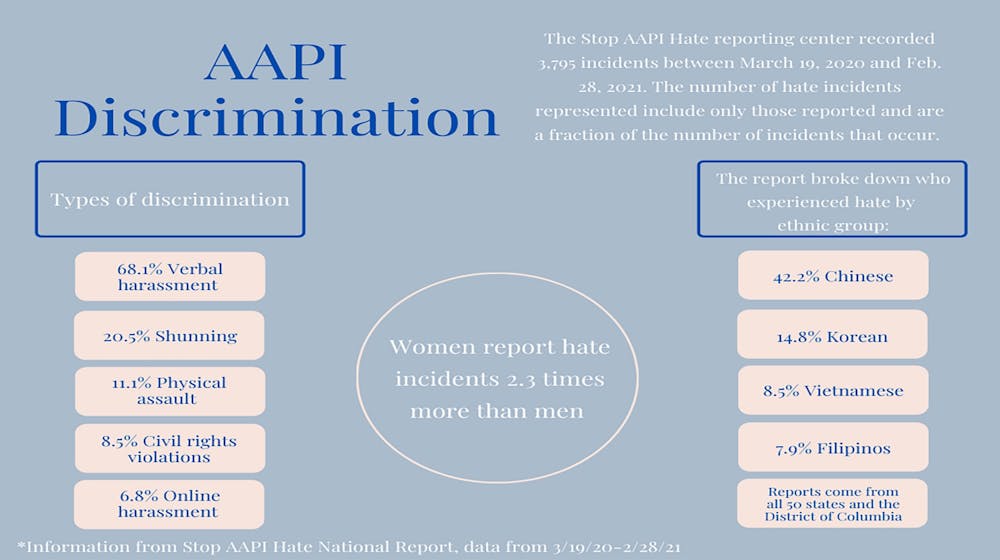According to the Asian American Journalists Association, the shootings targeting Asian spas and businesses in Atlanta on March 16 killed eight people. Six of the victims were identified as Asian and seven were women. At least four of those killed were of Korean descent.
FBI Director Christopher Wray told NPR that the shootings “do not seem to be linked to race” but are instead “probably motivated by a sex addiction rather than racial animus.”
However, the shootings come during a time when there are increasing attacks on the Asian American and Pacific Islander (AAPI) communities.
President Joe Biden signed a memorandum condemning and combating racism, xenophobia and intolerance against AAPI community members in the United States on Jan. 26. The White House cited the COVID-19 coronavirus pandemic and xenophobic rhetoric as factors that heightened risks for Asian Americans.
Stop AAIPI Hate is a reporting center run in partnership by the Asian Pacific Planning and Policy Council, Chinese for Affirmative Action and San Francisco State University’s Asian American Studies Department. The organization tracks and responds to incidents of hate, violence, harassment, discrimination, shunning and bullying against AAPI community members.
The report focuses on the time between March 19, 2020, and Feb. 28, 2021, in which there were 3,795 reported incidents. Stop AAPI Hate said that women make up 68% of respondents in the report. These numbers do not account for those who did not report or share their experiences.
The rising numbers nationally are concerning but locally most of our population may not notice any differences.
According to the SU spring 2020 enrollment and compliance report, 78 undergraduate and graduate students, who account for only 1.4% of the student body, identify their race as Asian. No students identify as Pacific Islander. The spring 2020 enrollment was 5,652 undergraduate and graduate students.
Although it is a small population, we must create a welcoming community for all people from all cultures. If we do not take time to recognize and learn about one another’s cultures, we foster an environment in which students with misconceptions and biases about Asian Americans and other campus minorities can graduate without having anyone challenging their beliefs because no one is teaching them differently. We should come to college to learn about other cultures and ideas, as well as to have our ideas challenged.
AAPI culture is more than Boba tea, anime, decorative nails and K-pop. All cultures are more than the popularized elements that the mainstream accepts and takes as its own. There is a rich history behind the cherry-picked traditions. We cannot pick and choose the “cool” or “popular” elements of a culture without recognizing and making an effort to learn and understand everything else.
We must offer our support not only in times of difficulty but in everyday interactions.
ACT (Ask, Communicate, Teach Tolerance) held a vigil Monday evening outside of the Ezra Lehman Memorial Library. There is a focus at SU for student-led initiatives. We tout our ability to start a group or hold events if one does not exist.
While it is important for student leadership, there also needs to be a certain level of university and community support.
A social media post or giving a student organization the space for an event aids in helping the success of the event. These events have the same core group of people hosting and attending. But having university officials and faculty members present at events would also go a long way. This may also attract people who would not usually pay attention to the events remembering the history of and celebrating the students’ culture and heritage.
It is our community’s responsibility to make every effort to ensure that all feel welcome on our campus, in our town and our nation.



The Slate welcomes thoughtful discussion on all of our stories, but please keep comments civil and on-topic. Read our full guidelines here.